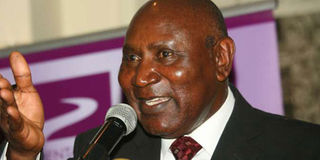Leaders back plan to reduce numbers of elected leaders

Auditor-General Edward Ouko gives a speech during the launch of a report at Stanley Hotel in Nairobi on October 12, 2016. ODM leaders have told off President Uhuru Kenyatta for criticising opposition leader Raila Odinga and Auditor General over Eurobond claims. PHOTO | EVANS HABIL | NATION MEDIA GROUP
What you need to know:
- Speaker Justin Muturi said the report tabled in the National Assembly on Thursday should trigger the conversation around what changes need to be made to the constitution.
- In Nairobi, Mr Munya, who also chairs the Council of Governors, said reducing the number of elected leaders is a progressive idea that should be supported.
Elected leaders on Friday supported a proposal to cut the number of peoples’ representatives as suggested by a group that audited the impact of the constitution.
National Assembly Majority Leader Aden Duale and Minority Deputy Leader Jakoyo Midiwo, Meru Governor Peter Munya and Senators Boni Khalwale (Kakamega) and Mutula Kilonzo Jnr (Makueni), however, differed on whether the changes recommended by the Working Group headed by Auditor-General Edward Ouko ought to be implemented before or after the next elections.
Speaker Justin Muturi said the report tabled in the National Assembly on Thursday should trigger the conversation around what changes need to be made to the constitution, now in its sixth year.
Speaking on the sidelines of a meeting in Mombasa with the Kenya Private Sector Alliance, Mr Duale said the finding that the country has more elected representatives than it needs is true.
There are 416 lawmakers – 67 senators and 349 Members of the National Assembly, and 2,526 MCAs.
“As far as the governance structure goes, we are bloated, it is expensive, uncalled for. I think even if we look at other countries, and I have seen the analysis by the media, our neighbours have more rational balanced structures. You can’t have 43 million represented by more than 3,000 people,” Mr Duale said.
He added the debate ought to come after the next elections, about nine months away.
“It is coming at the wrong time and we need to interrogate that document in 2018 when the 12th Parliament is in session,” he added.
Mr Midiwo said the conclusion was part of his contribution to the Working Group created at the behest of the Budget and Appropriations Committee.
The Gem MP said the bloated representation was created by the defunct Independent Boundaries Review Commission chaired by politician Andrew Ligale.
“The bottom-line is Kenya cannot afford the political offices that we have. Something has to happen or something will give. If we don’t cause it to happen, I think we’ll realise that we cannot borrow to pay idlers,” he said.
A GOOD IDEA
Mr Midiwo said that with smaller constituencies and more MCAs, it is more likely that the calibre of the elected representatives will be lower.
He gave Nairobi as an example, where most of the 17 MPs are former councillors and whose impact has not been felt.
He said it was possible to identify areas that can be dealt with immediately.
“There are areas that are difficult and others which are what you call low-hanging fruits. This is an issue that requires immediate amendment of the constitution. We cannot afford to move from 200 constituencies to 290 constituencies plus 47 woman reps plus 12 nominations. Something is seriously wrong,” Mr Midiwo said.
He noted it is possible to have the recommendations that require a referendum included in the ballot for the General Election in August 2017.
He said he had asked the Speaker to allow MPs to bring the issues to the floor by debating the report, which has to be first scrutinised by the Budget and Appropriations Committee.
Mr Muturi said the question of how many MPs and MCAs we have “is one of the things that would form any review that Kenyans desire for the Constitution”.
“Whether we are over-represented or not is a matter that should be subjected to the general populace because this is a view of the people who did the audit and of course it has been said by many people who think we are over-represented,” Mr Muturi said.
“Perhaps it is a wake-up call. If you look at what we gave ourselves in 2010 in light of the governance structure, devolution, most Kenyans desire devolution but at what cost? These are the questions we need to ask ourselves,” he added.
In Nairobi, Mr Munya, who also chairs the Council of Governors, said reducing the number of elected leaders is a progressive idea that should be supported.
“Personally, I agree we need to re-look into the issue. We are spending colossal sums to servicing certain institutions that are in this Constitution,” Mr Munya said on Friday on the sidelines of the Senate County Public Accounts and Investment Committee session at Parliament, Nairobi.
Mr Kilonzo Jnr said the primary objective for increasing the constituencies was for more Kenyans to benefit from the Constituency Development Fund.
However, he noted counties are doing the same leading to duplication.





